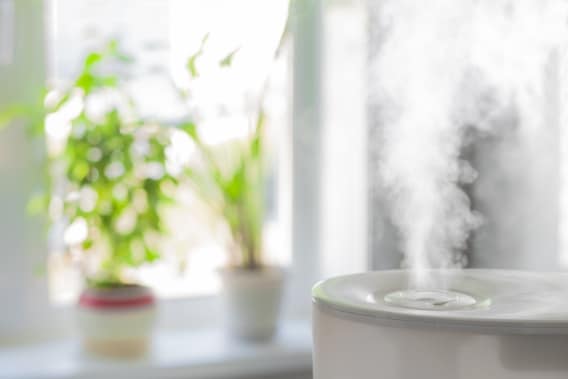How to Know the Ideal Humidity for Your Home
When discussing the climate and HVAC demands of a home or office, most people focus on only the temperature. However, knowing the temperature of an environment only tells you one aspect of the story. Compared to temperature, humidity is arguably an even more crucial measurement of the comfort and stability of a space. Of course, to make sure you have the correct humidity in your home, you have to know what level you are aiming for. Luckily, achieving the perfect humidity level can be an easy process once you know the proper measurements and procedures.

How Do You Measure Humidity?
Testing the humidity level of a room is simple, but it does require an inexpensive piece of equipment known as a hygrometer. Many people opt for a combination thermometer unit that can also measure humidity. If you would rather not purchase any equipment, an air quality professional at McGowan's Heating & Air Conditioning in Jacksonville would be glad to inspect your HVAC system and let you know if you have any humidity related issues to address.
Talk to a McGowan's Heating & Air Conditioning technician today
What Are the Symptoms of Humidity Being Too High?
High humidity can wreak havoc on a house. Not only does high humidity cause a space to feel damp or stuffy, but it can also lead to health issues as well as damage to your property. One of the most common issues with high humidity is mold. When there is too much moisture in the air, mold can be encouraged to grow on almost any surface. Thus, having a damp environment can lead to mold formation on walls, floors, and furniture. This is a significant problem. Not only does mold cause a space to smell unpleasant, but exposure to mold can range from having allergies to experiencing severe and long-lasting impacts on your lungs and immune system.
Beyond the issue of mold, high humidity can lead to other damage in a home. A prolonged period of high humidity can cause the paint to blister, wallpaper to peel, and floors to buckle. So, while having extra moisture in the air may seem harmless, it can lead to costly damage to a building. Many of the items we store in our houses are also easily damaged by high humidity. Instruments, books, furniture, and electronics are all extremely sensitive to moisture. Therefore, not controlling the humidity level properly can damage or ruin your valuable possessions.
Can Humidity Be Too Low?
Making sure the humidity in your home is at the proper level is not simply a matter of making sure it is low enough. Rather, having humidity too low can also cause issues. Typically, these concerns are more minor than issues resulting from high humidity. However, having the humidity be too low can make a house feel stagnant and uncomfortable. Further, many individuals find that low humidity levels can lead to allergies and discomfort breathing. Thus, it is important to make sure your residence has a minimum level of humidity.

Low humidity can also lead to issues with the home itself. Extremely low humidity can cause floors to shrink, resulting in creaky or loose boards. In addition, low humidity can make wallpaper or paint brittle and prone to cracking or damage. In short, while you should always err on the side of lower humidity, there is an ideal middle ground.
What Level of Humidity Is Right?
Humidity is measured in percentages based on the amount of moisture the air can hold at a given temperature. At 0% humidity, there is effectively no moisture in the air. In contrast, at 99% humidity, the air cannot hold any more moisture without precipitating out the liquid. The perfect level of moisture will depend upon several factors, including your preferences, your location, and the contents of your home.
Generally, an average goal to aim for is 55% humidity. At this moisture level, the air will feel comfortable without feeling sticky or muggy. Yet, this number can change depending on your environment. For people who live in extremely dry climates, it is often preferable to have a slightly higher humidity level inside to combat the dryness of outside air. In contrast, those living in southern regions with high humidity often prefer to have lower interior humidity to combat the uncomfortable feeling of the natural air.
Personal preferences can also play a role in choosing the “ideal” humidity level. People who suffer from allergies, asthma, or other respiratory challenges often find that a higher humidity level can combat many symptoms. This is also true for individuals with naturally dry skin. In contrast, people who are naturally predisposed to perspiration or feeling warm typically find less humidity to be more comfortable.
How Can You Change the Humidity Level?
Of course, knowing the humidity level of your home or office, along with understanding your “ideal” humidity level, is only half the battle. Without being able to control the moisture level, measuring it becomes a moot point. Luckily, tweaking the humidity of your home is a straightforward process.
Many people believe that an air conditioning unit merely cools the air. This is only partially true. A large part of an air conditioner’s job is to remove moisture from the air. Due to the physical principles that air conditioners are based on, they naturally condense water out of the air, leading to lower humidity. In the summer, this is often preferable, but an AC unit can drop the humidity too low. Further, the heat produced by a furnace tends to result in less humid air. Raising the humidity of an area requires a device known as a humidifier. These are simple machines that vaporize liquid air into a gas, which raises the humidity level. Humidifiers are readily available online or in stores and relatively inexpensive.
Sometimes, you may wish to lower the humidity of the air without cooling it. During the fall or spring seasons, it is often too cool to run the air conditioning, but you nonetheless wish to drop the humidity. For this, you need a dehumidifier. These are similar to air conditioners but without the cooling effect. These devices are commonly available but can be somewhat larger and more expensive.
Rely on the Professionals
Knowing the humidity levels of your home or office can play a huge role in your ability to maintain a comfortable and protected environment. As we have seen, the processes are fairly simple to measure or modify humidity. However, some experimentation is sometimes needed to find the humidity level that suits your situation the best.
If you have any questions about the humidity levels of your house and would like to consult with NATE-certified heating and cooling technicians on the topic, you can look to McGowan's Heating & Air Conditioning. Even if the humidity level of your house is perfect, we will be happy to help you with any heating, air conditioning, or inspection services. We’re a BBB-accredited business with an A+ rating, and our team has been serving the community for more than 40 years. Contact McGowan's Heating & Air Conditioning in Jacksonville today for an appointment.



